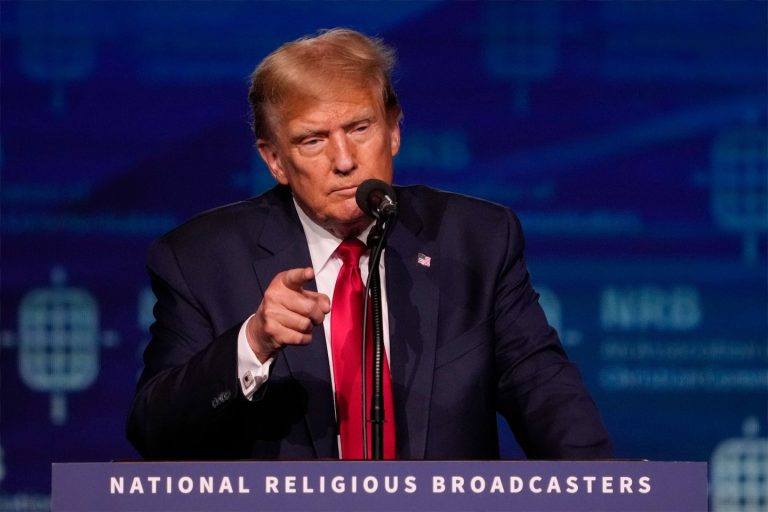For a religious audience, this presentation is more powerful. A struggle between good and evil for the fate of the world is essential to many religious traditions and certainly to the right-wing evangelical Protestants to whom Trump most often attempts to appeal. So when speaking to Christian conservatives — as Trump did Thursday night — apocalyptic rhetoric and warnings of impending doom carry added weight. Especially when Trump focuses on the threat to Christianity itself.
Trump’s speech contained a familiar apocalyptic sentiment. For example, the public was told that those who had “unleashed crowds of foreign jihadists to praise Hamas in our streets – they are praising Hamas while slandering law-abiding Americans as domestic terrorists.” “. They were told there was legislation allowing the death of newborns as part of life extension. abortion rights. They were told that a second Trump administration would “take back our education system from the communists and the monsters who are destroying it.” The “monsters” here presumably include those who advocate the “transgender madness” he mentions in the next sentence.
But his speech focused on the need for Christians to rally around him and his candidacy.
“How any Christian can vote for a Democrat – a Christian, or a person of faith, a person of faith – how to vote for a Democrat is crazy,” he mused at one point. “It’s crazy. They need to stop.
After all, he later said, Christians were under attack from the left. It was something he was committed to stopping.
“I will create a new federal task force on combating anti-Christian prejudice. It has become a very strong term of anti-Christian prejudice. It’s unbelievable that you have a term like that, is it? When we think about it, we ask ourselves: where does it come from? And this is a very, very recent phenomenon,” he said. “Its mission will be to investigate all forms of unlawful discrimination, harassment and persecution against Christians in America.”
Of course, this comes from the evolving backlash against the decline of American religiosity – a development to which Trump himself has enthusiastically contributed.
The decline itself is not new. In 1976, Tom Wolfe wrote on the emergence of the “Me” generation, observing that “since the late 1950s, the Catholic Church and mainline Protestant denominations were aware that young people, particularly in cities, were drifting away from the faith” . But at the time Wolfe was writing, it wasn’t just about young people. It wasn’t just people on the left either.
Every four years, the American National Election Studies (ANES) survey gauges public opinions. Since the 1960s, there has been a steady decline in the percentage of Americans who identify as Christian – across all political groups. But most Democrats, like most Republicans, remain Christian.
But Trump was speaking to a specific subset of American Christians: conservative Christians, a group that heavily overlaps with white evangelical Christians.
In his two previous presidential bids, Trump enjoyed overwhelming evangelical support. Pew Research Center estimates that Trump won evangelicals by 60 points in 2016 and by nearly 70 points four years later. Meanwhile, PRRI data released in 2021 showed that there was a strong correlation between the percentage of white Christians in a county and Trump’s margin of support.
Religious leaders are certainly concerned about the decline in religious participation, as they were in Wolfe’s time. There is a reason why Jesus Christ was announced during the Super Bowl.
But it is especially on the right that this extension of this insecurity, this feeling of self-esteem, exists. YouGov poll from October (and regularly before) watch that Republicans are more likely to say that Christians are discriminated against than to say that Muslims are – or that blacks are.
Of course, it is much less about religion and more about culture. Conservative Christians who rally around Trump are not doing so because he is a strong Christian. Trump even joked about it during his speech Thursday, admitting that he “may not know (the Bible) that well at all.” They are rallying around him because he promises to fight for broader social change, one that leaves space for non-conservative Christian feelings and values.
There is an irony in his rhetoric that Trump probably doesn’t recognize. One likely reason why Republicans fare better with black Americans – according to Gallup data. suggests that they are – is that young black Americans are less likely regularly attend religious services, and black Americans who do not attend church are less likely to be Democrats.
The erosion of community caused by regular church attendance correlates with an erosion of partisan loyalty among black voters.
But again, Trump is a salesman. He is making a sales pitch to an audience. If atheists represented a fifth of the electorate (like evangelicals made in 2020) and responded fervently to Trump’s rhetoric, does anyone doubt that Trump would be happy to give speeches to atheist groups focused on how he would be their advocate? In this case, he’s telling a group that feels like they’re losing their cultural power that he’s right and he’ll make sure that’s not the case.
It worked in 2016 and 2020. Why wouldn’t it work now?


